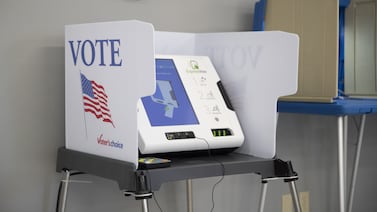A version of this post was originally distributed in Votebeat’s weekly newsletter. Sign up here.
Here at Votebeat, we’ve been saying it for a while: Before you draft legislation about elections, you should probably, IDK, consult with an election administrator to check whether you’re about to disenfranchise thousands of people due to a technicality. We found out about such a wrinkle in Texas’s election bill and covered it for our partners at Texas Monthly.
A quick summary: Texas lawmakers, apparently without most of them realizing it, included a new provision in the election bill that has implications for as many as 1.9 million Texas voters, about 11 percent of the state’s voting population. Why? Because it would beef up ID requirements for absentee ballot applications, requiring voters to provide either a partial Social Security number or a driver’s license number. The county then compares that number to the identification number on file in the voter registration system. But those nearly 2 million Texans only have one of those two numbers in the system, not both. So, if they guess wrong when they apply — easily possible if they registered to vote years before — their application would be immediately rejected with no clear way to appeal.
Texas lawmakers were made aware of this problem. Chris Davis, the elections director in Williamson County, testified before the House committee and urged them to address it. “I challenge any person on the committee: Do you remember what you filled out when you got your voter registration?” he asked. “I certainly don’t. And I’m in the business of this. And if they don’t match, we’re rejecting.”
Nonetheless, the committee passed the bill without any changes. Two days later, the full Senate passed its version of the bill, which also contains the provision. Now, the only way to address the problem is to hope that the full House decides to amend the legislation. The problem? Most House Democrats, obviously, aren’t even in the state to enable a quorum. The bill in some form will pass eventually, of course, because the Democrats cannot stay away forever and Gov. Greg Abbott has pledged to call as many special sessions as necessary.
Several Republicans told Votebeat it was not the intent of the bill to, as one put it, “make registration into a game of gotcha.” He expected they would fix the problem once the bill was heard on the floor of the House. We shall see!
Back Then
Now, for some history. States have been worried about absentee ballot fraud since absentee ballots were devised as a way for Civil War soldiers to cast ballots away from home. By the early 1900s, most states allowed voters some ability to cast ballots by mail, and in many states anyone could do so if they were away from their home on Election Day for any reason. As the practice grew, the concerns over fraud did as well. But one notable exception was for soldiers. Many of the common security measures for mailed ballots — such as strict chain-of-custody procedures or witness requirements — were suspended for soldiers’ ballots, and courts gave extremely wide latitude toward the process for collecting and counting them. One New York court in 1917 wrote, “every reasonable facility should be provided for the casting and canvassing of [soldiers’] votes without the strict application of all the formalities provided by the election law.”
In Other Voting News
- Partisan-audit-mania is spreading to Texas. Several Republicans in the quorum-less House of Representatives support a new bill that would conduct third-party audits of the 2020 election results in the 13 counties with populations greater than 415,000. (Biden was the winner in 10 of those.)
- The consequences of these partisan audits are coming to bear in Pennsylvania, where the acting secretary of state decertified one county’s voting machines this week. Fulton County allowed a third-party company to inspect its voting equipment in December at the request of Republican state Sens. Doug Mastriano and Judy Ward, who have been on a mission to conduct forensic audits around the state. Even Republican Rep. Seth Grove agreed with the SoS that the county erred in turning over the machines and must pay the price (about $25,000). “Fulton County will have to buy new machines at the expense of Fulton County taxpayers,” Grove said.
- Also in Pennsylvania, a compromise could be on the horizon over the Republicans’ once-vetoed election bill. Democratic Gov. Tom Wolf said he’s open to a version of a new voter ID requirement, so long as it wouldn’t suppress the vote, as he asserted the GOP’s law would have. It’s still unclear whether Democrats and Republicans will finally negotiate on legislation that stands a chance of passage—even as productive offerings for voters, like early in-person voting, and for administrators, like pre-canvassing, are on the line.
- There’s new evidence from Arizona that voting fraud was extremely rare in 2020. The AP collected county records for any incidents of suspected fraud it could find, and tallied 182 cases that have been forwarded to prosecutors to investigate. Of those, charges have been filed in four cases. None has led to a conviction yet. A vast majority of the cases originated in Pima County, which pursues suspected fraud aggressively. Eleven counties had not referred any cases to prosecutors.
- The “certified fraud examiner” hired by the sheriff of Barry County, Michigan, to investigate voter fraud in the 2020 election has so far attempted to question at least six township clerks. The sheriff, who has ties to Donald Trump’s legal team, says he’s not using county funds to pay the private investigator but that a county deputy is assisting him. One prominent elections expert this week called the effort “law enforcement malpractice.”
- An activist has sued the Kansas Secretary of State’s office over its deletion of a statewide database of those voters whose provisional ballots were rejected. Last year, the same activist sued for access to the list, which he was granted by a court. This year, when he asked for 2020 data, he was told the office no longer had the ability to produce the data. The ACLU, which sued on his behalf, alleges that Secretary Scott Schwab, a Republican, unlawfully withheld the information and, upon losing the lawsuit, made it impossible to get the information in the future. Schwab told the Kansas City Star the information was not useful to his office and he was not obligated to maintain it.
- New Mexico Secretary of State Maggie Toulouse-Oliver has issued a plan to install dropboxes, bolted to the ground and with 24-hour video surveillance, across the state. The Republican Party is opposed to the plan, which they say will increase fraud (though they presented no evidence of any such history). The dropboxes should be “in place in time for local elections this fall.” The New Mexico legislature voted to allow the installation of such drop boxes in 2019, but the funding never materialized. The secretary’s office told the Albuquerque Journal it had secured a mix of federal and state funds to make the program possible.






